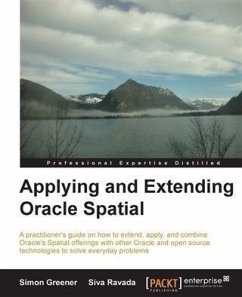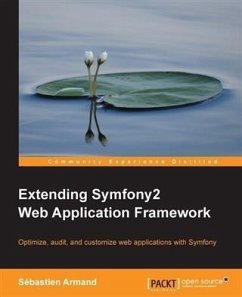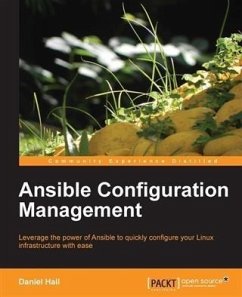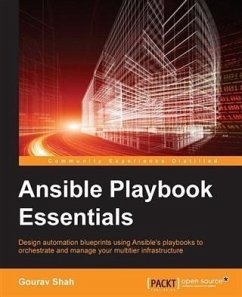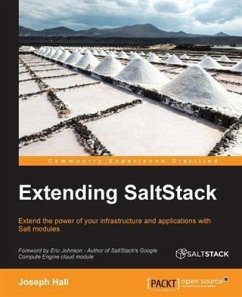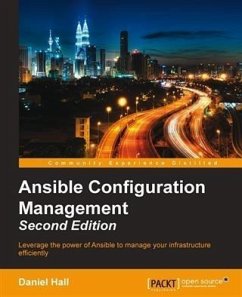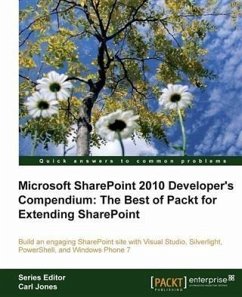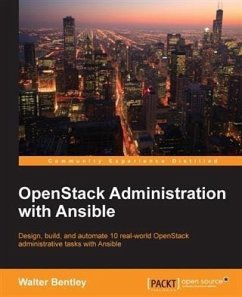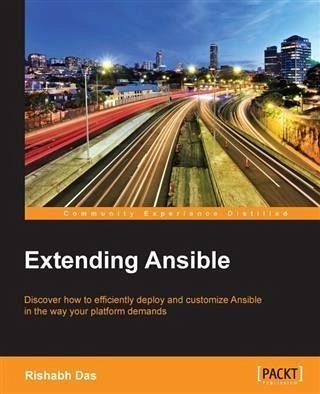
Extending Ansible (eBook, PDF)

PAYBACK Punkte
10 °P sammeln!
Discover how to efficiently deploy and customize Ansible in the way your platform demands About This Book Get the first book on the market that maximizes the functionalities of Ansible Master the skill of extending Ansible by deep diving into its modules and plugins Work through this step-by-step guide to customizing Ansible according to your requirements Who This Book Is ForThis book is perfect for developers and administrators who are familiar with Ansible and Python programming, but have no knowledge of how to customize Ansible. What You Will Learn Get a thorough understanding of Ansible...
Discover how to efficiently deploy and customize Ansible in the way your platform demands
About This Book
This book is perfect for developers and administrators who are familiar with Ansible and Python programming, but have no knowledge of how to customize Ansible.
What You Will Learn
Ansible is an IT automation tool that lets you manage your Infrastructure as a Code. It helps you deploy your applications and manage configurations, thus making life easier. Ansible, in most ways, is self sufficient to address most of your requirements.
Ideally, standard modules, libraries, or plugins are used to automate a given IT platform. Customizing Ansible can be done by custom module and plugin development.
This book shows you how to automate most of the tasks in your IT environment, thus minimizing the need to manually perform scheduled tasks and extend your Ansible implementation by developing customized modules and plugins.
You'll begin by getting an understanding of the fundamental aspects of extending the Ansible framework, such as custom functions and reusable modules. You'll then progress to building custom plugins and extensions using the fundamental building blocks explained earlier. We'll also show you how to automate some tasks using scripts. Finally, we'll demonstrate how these extensions can be seamlessly integrated into existing Ansible installations and explain how to conduct unit testing on these extensions to ensure they work as desired.
Style and approach
This book is a learning book on the fundamentals of Ansible framework and how it can be leveraged to extend it using the modules and plugins.
About This Book
- Get the first book on the market that maximizes the functionalities of Ansible
- Master the skill of extending Ansible by deep diving into its modules and plugins
- Work through this step-by-step guide to customizing Ansible according to your requirements
This book is perfect for developers and administrators who are familiar with Ansible and Python programming, but have no knowledge of how to customize Ansible.
What You Will Learn
- Get a thorough understanding of Ansible modules
- Find out everything about plugins that fit in the Ansible architecture
- Get to grips with designing modules and handling errors
- Work with data structures
- Distribute Ansible extensions using PyPi and Git submodules
- Get to know the various distribution methods of modules and plugins
Ansible is an IT automation tool that lets you manage your Infrastructure as a Code. It helps you deploy your applications and manage configurations, thus making life easier. Ansible, in most ways, is self sufficient to address most of your requirements.
Ideally, standard modules, libraries, or plugins are used to automate a given IT platform. Customizing Ansible can be done by custom module and plugin development.
This book shows you how to automate most of the tasks in your IT environment, thus minimizing the need to manually perform scheduled tasks and extend your Ansible implementation by developing customized modules and plugins.
You'll begin by getting an understanding of the fundamental aspects of extending the Ansible framework, such as custom functions and reusable modules. You'll then progress to building custom plugins and extensions using the fundamental building blocks explained earlier. We'll also show you how to automate some tasks using scripts. Finally, we'll demonstrate how these extensions can be seamlessly integrated into existing Ansible installations and explain how to conduct unit testing on these extensions to ensure they work as desired.
Style and approach
This book is a learning book on the fundamentals of Ansible framework and how it can be leveraged to extend it using the modules and plugins.
Dieser Download kann aus rechtlichen Gründen nur mit Rechnungsadresse in A, B, BG, CY, CZ, D, DK, EW, E, FIN, F, GR, HR, H, IRL, I, LT, L, LR, M, NL, PL, P, R, S, SLO, SK ausgeliefert werden.




